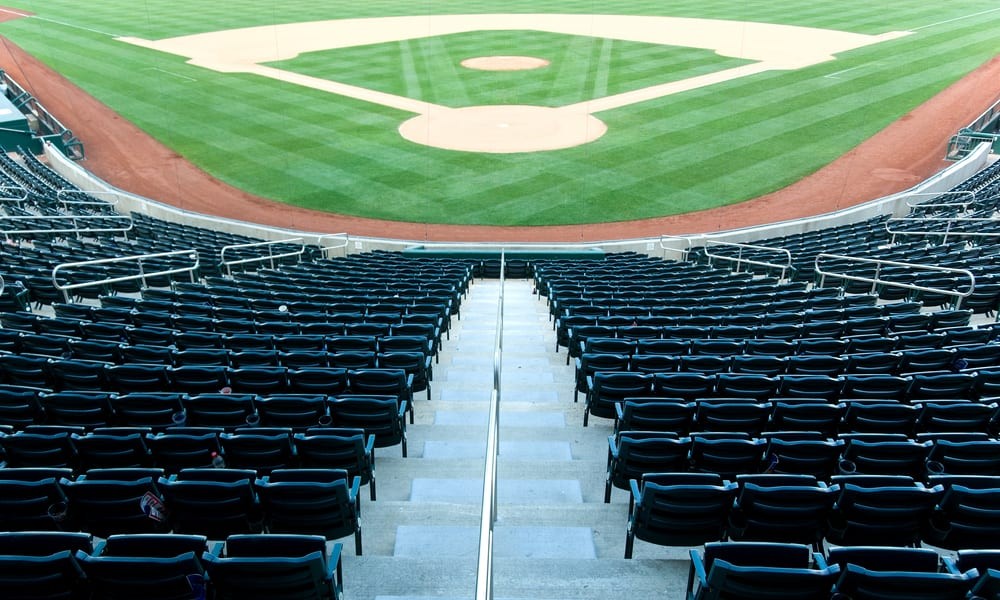There was once a discussion on Seinfeld in which it was agreed Tuesday is the one day that doesn’t have a “feel,” a distinctive place in the human psyche as a week unfolds. Having turned the calendar on April and May without baseball, I’d argue an entire season — spring, we call it — has less of a feel than it once did, a pandemic having temporarily erased the daily pulse of our national pastime. (If you can’t tell, I miss baseball like I imagine an amputee misses a leg.) That missing “feel” for spring includes no Masters, no Kentucky Derby, no NBA playoffs, no NHL playoffs. Spring in the year 2020 isn’t just numb . . . it’s blank.

But baseball will return. Perhaps in a few short weeks. So will other sports. Having endured close to three months without scores or standings to check, I have more questions than answers about the day we again have something to cheer. Here are a few.
• When can we again “join the crowd”? There will surely be a “phase” of spectator sports in which no spectators are allowed, probably the most disorienting component in this return to normalcy. Baseballs will land in empty bleachers, a walk-off home run generating no more noise than the home team itself can deliver. TV microphones will likely pick up teammates’ chatter on a basketball court, from screen calls to trash talk. If you haven’t watched the NBA on a 10-second delay, get ready.
• Will asterisks fall like rain?
The teams that play in the NBA Finals get a four-month off-season. If professional basketball resumes in July, every team that takes the court will have had close to that same four-month break. To suggest the team that emerges from whatever playoff tournament the league creates is the “2019-20 NBA champion” is an absurdity. Players who would have missed the regularly scheduled playoffs (in May and June) with injuries could well be fit and bouncy for the made-for-TV summer session. And a World Series champion crowned after an 82-game regular season? Yes, friends, there will be asterisks. Fat ones.
• What form will football take? Two enormous enterprises — television and college campuses — desperately need football back this fall. No sport sells commercials like a live football broadcast, and no sport fuels a college athletic department (if not an entire college budget) like the one we watch on fall Saturdays. But let’s be honest: There’s no sport on the planet less “socially distant” than football. An FBS roster includes 85 scholarship players. If quarantine is still part of the fight against the spread of infection, even two or three football players testing positive — considering the number of teammates they’ve, literally, contacted — could be catastrophic. Unless asymptomatic football players are to be ignored as potential carriers. Which could have dreadful, life-threatening consequences. Much can happen in the three months before football season arrives. Here’s hoping a rapid-testing mechanism and/or a vaccine are summer arrivals.
• Is there any pandemic benefit for a sports fan? Precaution will certainly mean the cancellation of the most fraudulent enterprise in American sports: preseason NFL games. These have long been snake-oil contests, sold to football fans in August for the same prices a November or December game costs, featuring players desperate to wear an NFL uniform, but unlikely to actually make your fantasy team come fall. (Players don’t make NFL rosters by performing in preseason games. They do so based on their draft position and contract terms.) The NFL announced plans for a 17-game regular season (one more than has been played since 1978) with a reduction of one preseason game per team. Perhaps the pandemic will force a larger reconsideration of snake-oil “professional” football.
• If we can’t go to the games, are the games worth playing? Emphatically, yes. If leagues can come up with smart, science-based protocols for playing games that count, then play ball. Television will be a lifeline for fans, but even the games we don’t see — consider the thousands you don’t see in a normal, pre-COVID year — will be worth the news and stories they generate. Humanity needs news and stories built for distraction more than we have since World War II. How did LeBron stay in shape during the shutdown? Can a Stanley Cup Final be played when it’s 90 degrees outside the arena? If Tim Anderson bats .400 this season, will the headless Ted Williams roll over in his grave?
We need to feel sports again. So much healing remains, and that goes for the entire world. Turns out the games matter most because they don’t matter all that much.